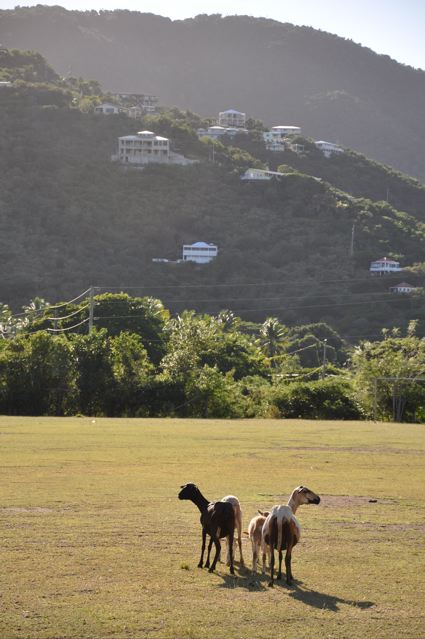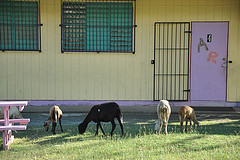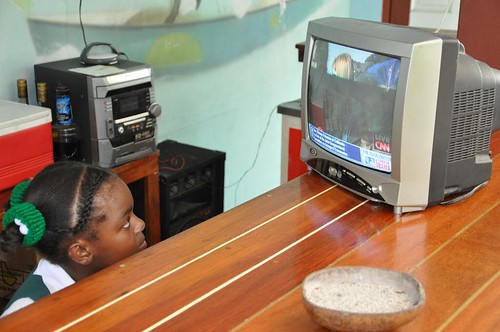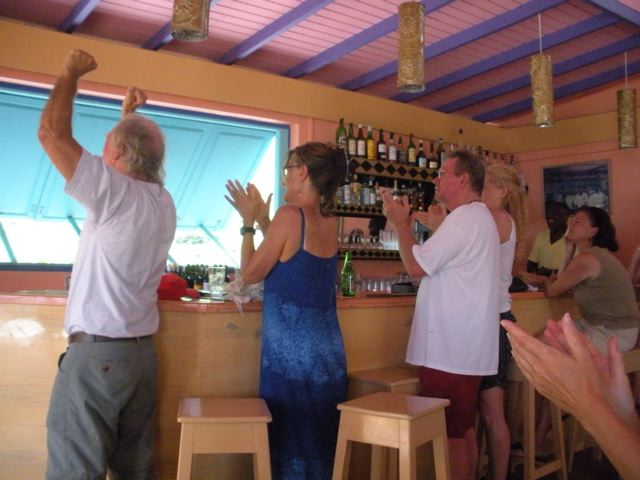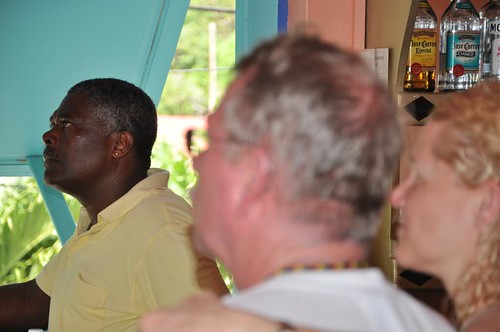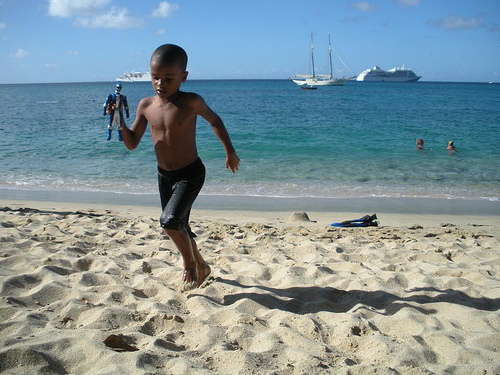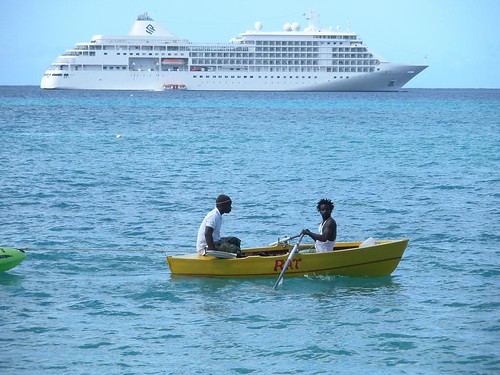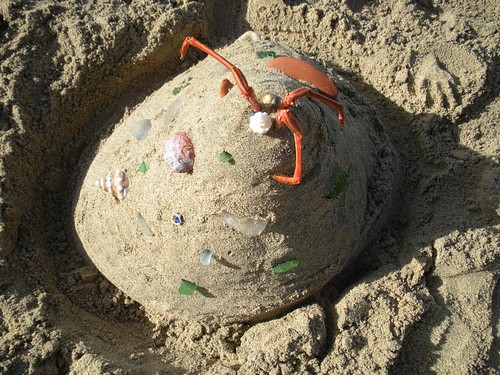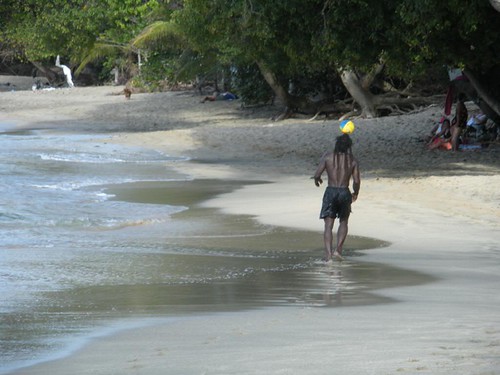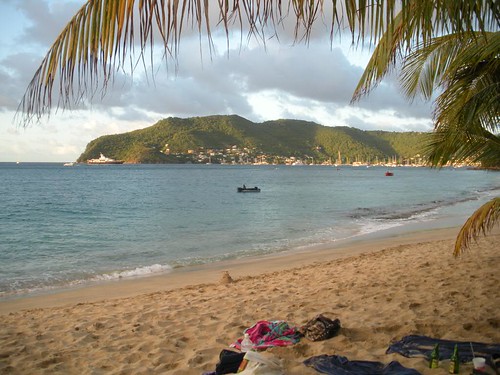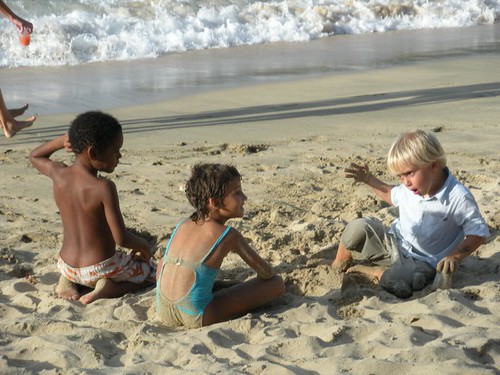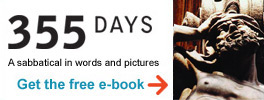The alarm chirped at 5:55, long before sunrise, but this insomniac had already been stirring for hours. So we arose fast, snarfed food, and began this Sabbatical’s most ambitious day of travel. Taxi Calvin to downtown. Friendship Rose schooner to Tobago Cays. Water taxi to Petit Martinique. Ferry to Grenada. Taxi to our next home.
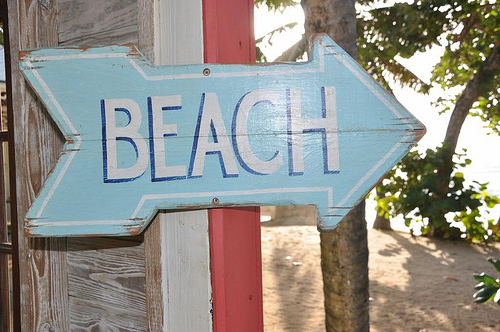
Taxi Calvin was uncustomarily late. But after our requisite (and passionate) dispute (that he “won”) a few days earlier, this was a predictable rebuff. Yet he got us to port, whereupon we and our large luggage boarded the stunning old schooner and enjoyed the generous continental breakfast that was awaiting.
- The Promises of Sail: Get Bliss or Seasick
The trip exceeded expectations of beauty, service, and comfort—for the first half-hour or so. Then the dark clouds began to roll in. It rained. Hard and long. Stinging and cold. Captain Lewis had all sails up and engines on and tried every maneuver, but the clouds followed us like pesky dogs.

Elegant white pillows filled like wet sponges. The deck turned into a skating rink. Crew donned raingear while the rest of us had none. (Note to posh boat: Keep cheapo ponchos for your customers, please.)
The mammoth vessel had space to burn, but only two places to try stay dry: Under a little canopy on deck; or in the cabin below. I avoid cabins in choppy seas—in that way that I avoid puking when possible. But my family descended into the dry but perilous purgatory.
For a while, that is. Then, naturally, they came up and started belly-aching. My sick 5-year-old, CurlyGirl, collapsed on my lap as I sat under a corner of the canopy on the hard, drenched deck.
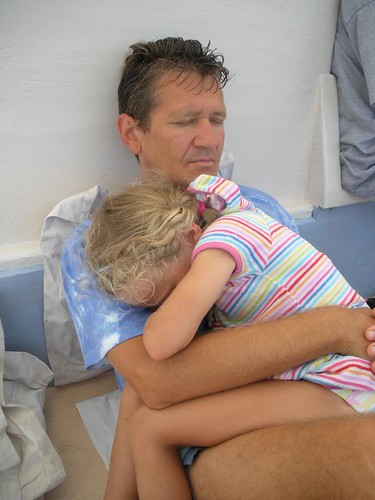
And there she stayed for, oh, an eternity or two. My squished body went from uncomfortable to miserable. But she fell into a shaky sleep, after much moaning and whining, and a few hours later woke up giggling about a few “little burps.” In no time, she was ambling her way back to stability—and I was happily munching more ibuprofen.
That was a big, messy bullet to dodge, as our 11-hour travel day was mostly on boats. In the worst-case-scenario fearbook, she could have been green and groaning all day.
Thanks to motor-sailing in uncooperative but heavy winds, (so loud, so unromantic), we made it “on time” to the Tobago Keys—a surreal preserve of tiny, beachy islands plopped atop a shallow reef and loved to near-death by 100s of yachts. A dinghy took us to a tiny secluded islet. A place where you can stand on a strip of sand, face out, and see nothing but uninhabited cays.
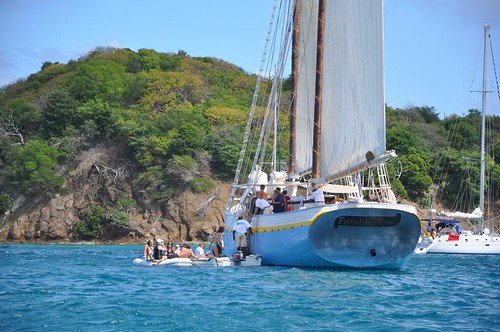
The trip was off to a so-so start, but that moment provided the payoff. This was the edge of the earth. A place where simply standing makes your spine tingle. A snorkel revealed dozens of endangered hawksbill turtles; even CurlyGirl saw several and felt the enchantment. Then we were rushed back to the boat for lunch, as we’d soon be picked up by a water taxi right here, in the middle of nowhere.
- Island Time Knows 2 Speeds
The thing about “island time” is that it’s very digital. Usually it’s on “LOW”—slow and sluggish; don’t even try to rush things or people and powers conspire to gradually assimilate you. But when someone in charge of your destiny gets a bug up their butt, and there are a lot of bugs in the tropics, they get ants in the pants and make you dance.
So it was when our dinghy driver asked us if we wanted to snorkel some more, a mere rhetorical question. Because then, he abruptly shifted to “HIGH” and started barking at us to get our stuff and get back to the Friendship Rose. Speedi (the taxi driver) had arrived. Very early. But he too was on “HIGH.” 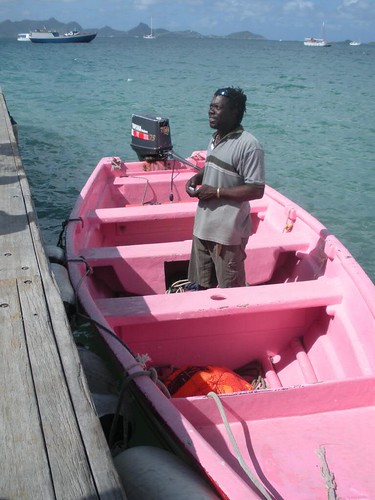
Indeed, there floating about 12 feet off the stern of the FR was a sorry tub painted pink, and one sunglassed race-driver with a hand on the ample motor. Back on the Rose, I pulled aside Captain Matt (an acquaintance from long ago that we did NOT know would be on the boat, but that’s another story), “Isn’t Speedi early?”
Matt confided, “Yes, and that’s unusual. He must want a little something to eat.” And sure enough, Speedi boarded after us, shook our hands, and got a bonus lunc,. As we gobbled (a yummy chicken dish with Calypso sauce) and gabbed, “island time” hit the “HIGH” button again, and the crew started throwing our luggage down to Speedi’s boat. Everyone started hollering commands about needing to set off before the dinghy got to the boat with the rest of the remaining, and staying, passengers.
Captain Matt did some quick Q&A and PR work on our behalf with Speedi, some of which went something like this…
M: Speedi, do you have a tarp if it rains? These people have electronics gear.
S: You doan need to worry yo’seff about no rain!
M: I’m not worried, Speedi. They asked me so I’m asking you.
S: (Quick glance at sky)…I doan tink it gwine rain. If it rain, we figga some-tin out.
M: Well, we have some large garbage sacks…
S: Yeah-yeah-yeah. Give me sum dem big socks, mon.
Speedi moved full-speed at distributing our stuff and our persons for weight and mind control. My “seat” assignment was beside clingy CurlyGirl, and on the edge of the boat—ensuring that I would endure nonstop ocean spray plus the sensation that I was about to fall off.
Our new, now-rosy friends on the Friendship Rose waved with one hand (while the other clutched drinks)—just like in the movies—while Speedi hit the motor and we lurched into the seas. When I enquired about the gnarly conditions, he shouted, “Yeah, it does be pretty choppy out dere today, but I does have some life preservers.” I’m sure he did, though I couldn’t say where.
But away we went, into the rocking and roiling blue abyss.
To be fair, we took air only five or ten times. The kids loved it, sometimes. I found it frightful and delightful, and kept reminding myself that since I signed up for this at great cost, surely I could soak it all in and keep fear, if not seawater, at bay. That worked mostly, though less so when AllBoy would thrust his arms in the air as if we were riding a roller-coaster. “Boy Overboard!” was not on this itinerary!
Speedi spent most of the time selling us, his captive audience, on taking a full day trip with him to study all the sights we were buzzing by—bellowing in harmony with his big motor.
- The World’s Tiniest Port?
Finally, we slowed, and started entering the world’s smallest port, Union Island. Speedi babbled about this taking “maybe 3, maybe 5” minutes, which I know means add a zero to both numbers and start to pray. I asked if this was the customs stop where we’d have to pay a fee. He replied, “Yes! $68 EC”—different from what others had quoted—but added, “Maybe since you wid me I git you outa dat money today.” My eyes rolled, both from the rough ride and his expected comment.
Frozen-in-time (or was it ice and rum?) yachties watched us drift in, while the little boys fishing on the dock stopped to stare. Speedy tied up loosely to a slivery dock, left all our stuff, and commanded, “Follow me.” Island time was still on “HIGH.” We scampered for several blocks on a muddy road—past dead shops, tiny bars, a neglected “Yacht Club,” and shanties.
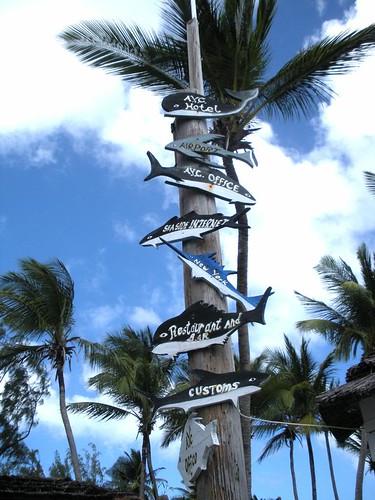
Once inside the world’s smallest airport, it was clear that we would undergo some sort of customs thing here, as there was an 8” x 10” yellowed, ripped piece of paper on a door that said “Customs In Here.” But that’s another story, too, this surreal customs encounter.
At any rate, and by that I mean at least 30-50 minutes (and only a few “Please dear Gods…”) later, we emerged—having gradually been granted permission to leave the north end of the Caribbean and enter the south end. An invisible line in the sand and surf that says: Good-bye, St. Vincent Grenadines; Hello, Grenada Grenadines.
Best of all, they waived the fee. Speedi gave himself the credit, but it didn’t hurt that the kind lady was smitten by our rare, blonde, little CurlyGirl.
Speedi pushed us back into his giant floating bathtub, and off we returned to the wild blue yonder for more thrills and chills, as waves and swells grew to several feet and Speedi zipped around them like an Olympic bobsledder, or else over them like an Olympic ski-jumper.
As with the first leg, the middle of the voyage was the worst—once protection from islands and reefs disappeared. We watched our luggage take a sea bath. Sunglasses became salt-glasses. And we passed some surreal sights: Abandoned homes built on remote, unreachable precipices; bedroom-size islands with one palapa and a chaise lounge; peninsulas piled high with precious conch shells, some ancient gray, some fresh pink.
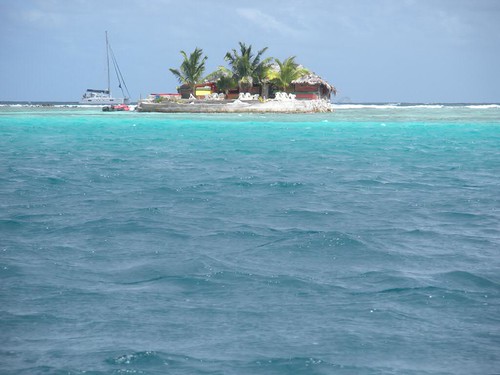
Who ARE these people!?! I kept wondering. What do they “do” for a living? Or are they on a secret, perma-BreakAway? Before I could figure all that out, Speedi mercifully slowed toward a dock on Petit Martinique, population 1,000 (as if!). Thanks to Island Time on “HIGH,” we had arrived an hour and 15 minutes early. Go figure.
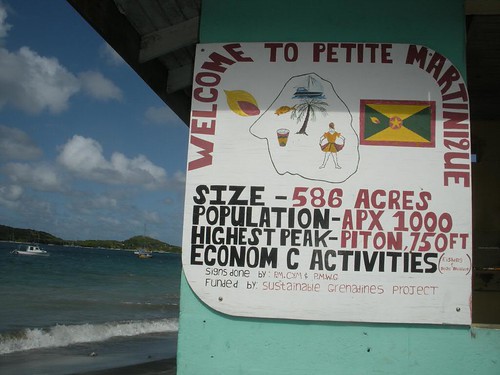
PM (as its called down here) had not a lot of “there” there. So AllBoy went exploring a dirty beach with 1000s of forgotten conch chunks. CurlyGirl needed a bathroom, which set off an lengthy expedition. And I rested on wet baggage and watched this little world go by—a few loud fishermen coming in, a curious boy not in school, and some Bible-toting ladies sauntering off to do the Lord’s Work.
Finally, the impressive Osprey Express tooted its arrival and came slamming into the dock, looking out of place on this Gilliganesque island. At most, 5 or 10 of us boarded. My children chose the air-conditioned indoor area. Partner and I took choice seats on the deck. 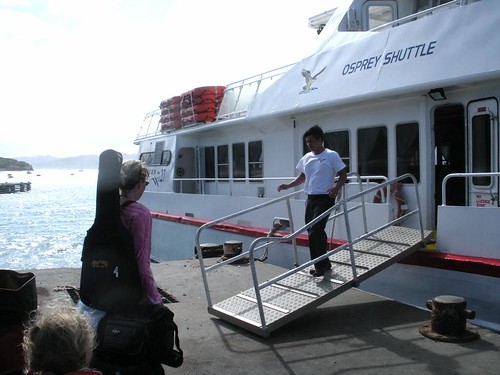
One more stop before Grenada: Carriacou. This time, 100 enthused folks piled on, including a rowdy cricket team celebrating victory (or loss), a dozen international tourists, and one large motorcycle. The ride was fast and smooth, with myriad, mysterious flying fish soaring, veering, and skipping over our wake like so many waverunners.
Speaking of, two rambunctious waverunners DID soon find us, and join the flying fish in riding the waves. The world being a small place, they occasionally rode right up to the deck and had conversations with friends on board. They all but passed along beers.
The emerald, craggy west coast of Grenada provided entertainment. And by the time the sun was setting, we pulled into the handsome port of St. George’s. 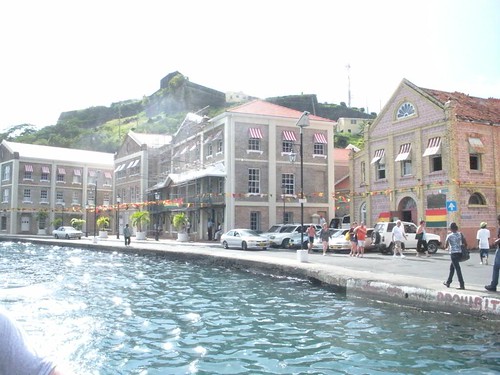
Taxis fought over us, almost literally, and the one who won was yelling, “STOOPID! STOOPID!” to the loser (who was yelling more and shouting much naughtier phrases) until we drove out of sight. (He kept his language G-rated on account of our children.) As usual, this driver sold us nonstop on his island tour while repeatedly pushing biz cards into my palm.
Then we checked into our little resort, a lovely and refreshingly sleepy place. Land felt good, but that wavy sensation took hours to subside.
After a day like that, the buzz wears off slowly. So unpacking clothes and gear and taking an enthusiastic swim in the cool saltwater infinity pool were good ways to wind down. Overpriced Sauvignon Blanc was room-serviced to our villa. The restaurant took its sweet, “LOW” Island Time to feed us supper. And we toasted our adventurous day.
We did it. We’re drained, but still in one piece.
Grenada looks grand. And we have about 27 days to make ourselves at home.
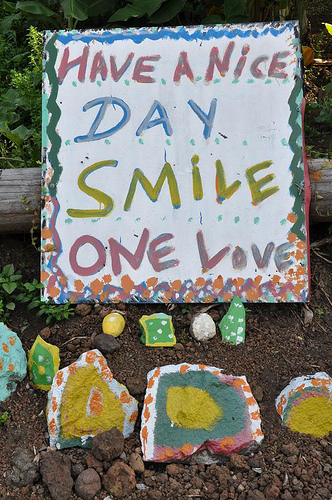
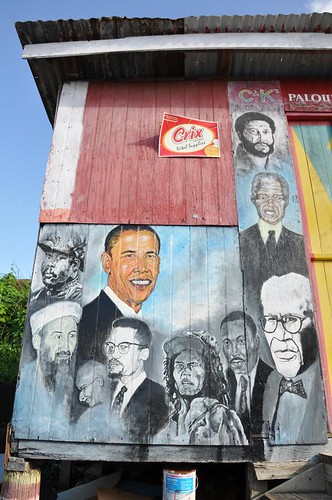


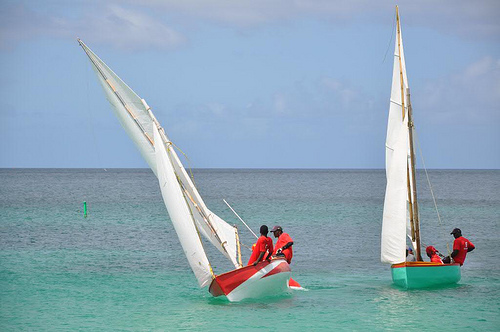


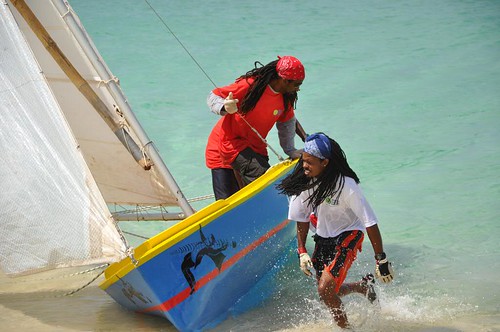
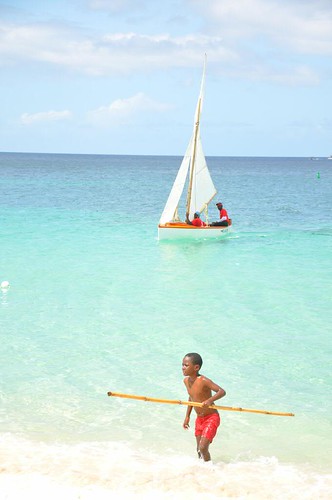
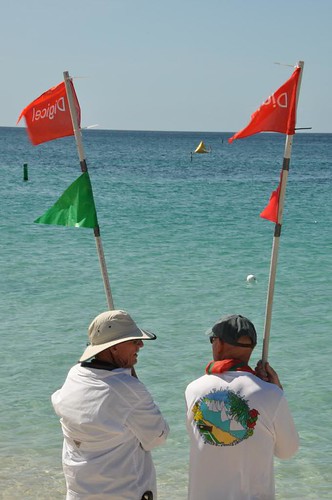
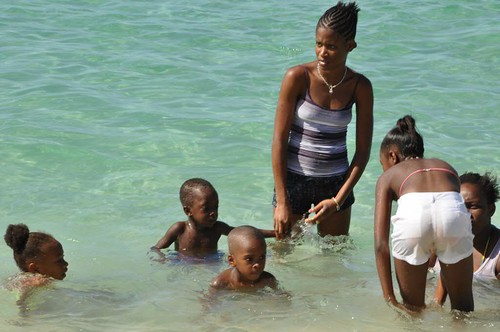
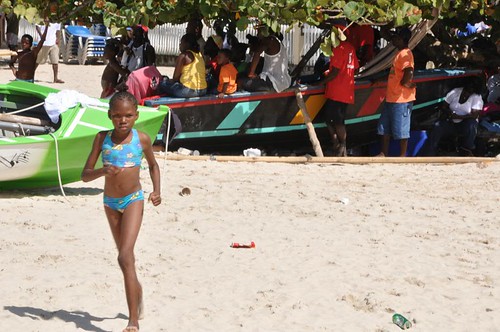
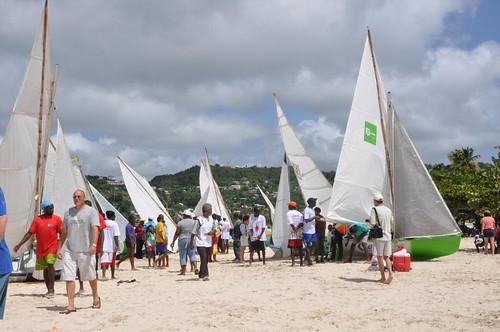

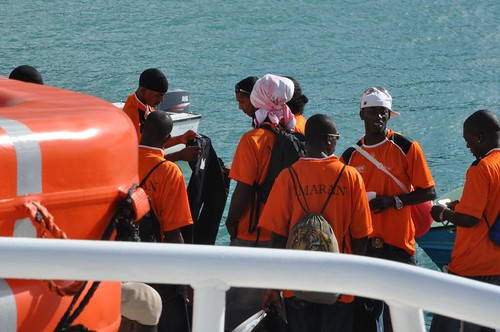
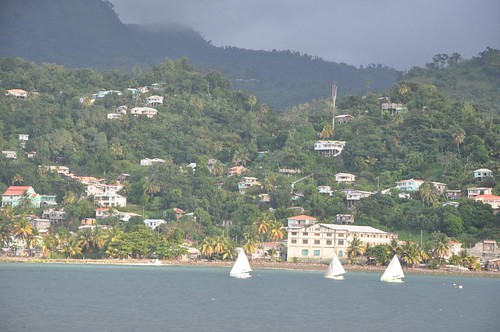
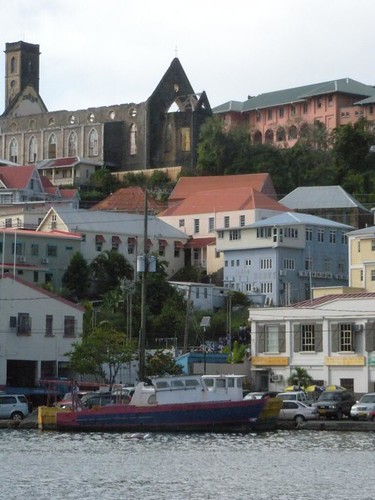
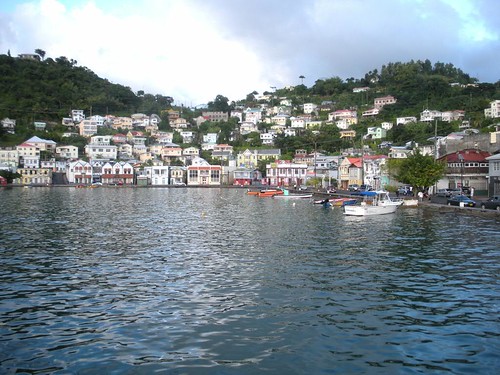
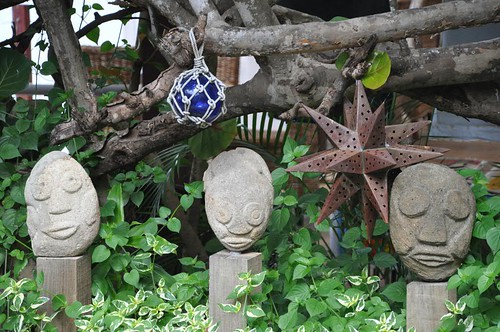
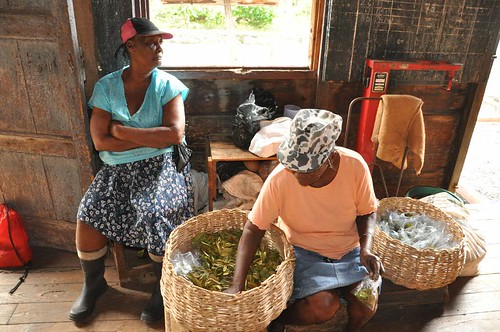
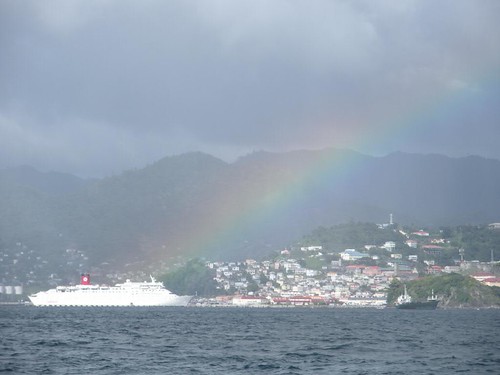
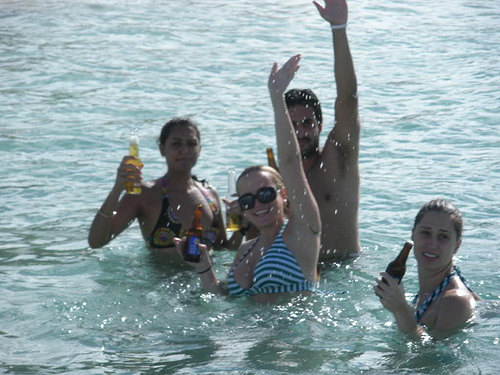
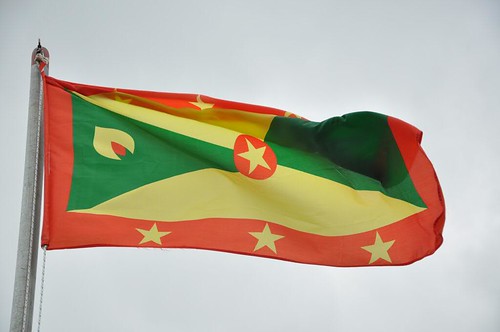










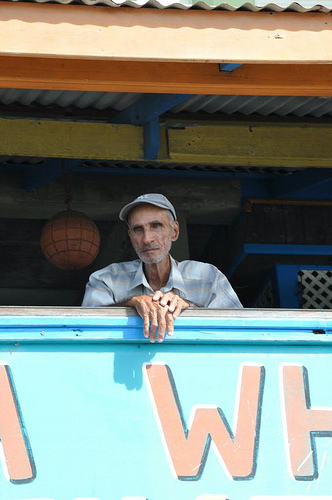
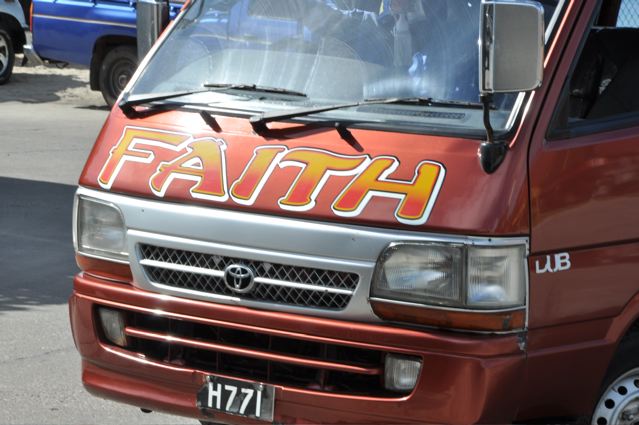
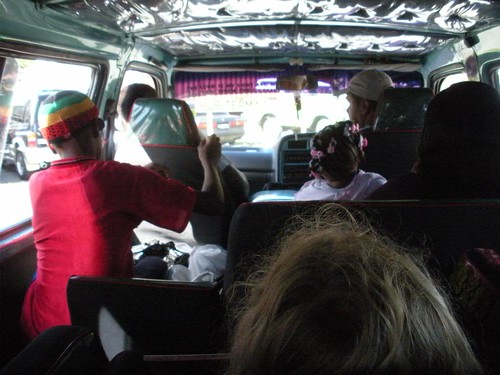 What if someone needs to get out and we’re all in the way?
What if someone needs to get out and we’re all in the way?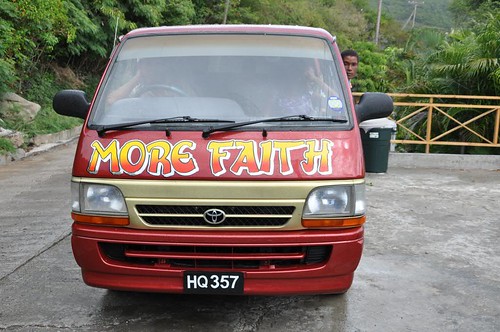
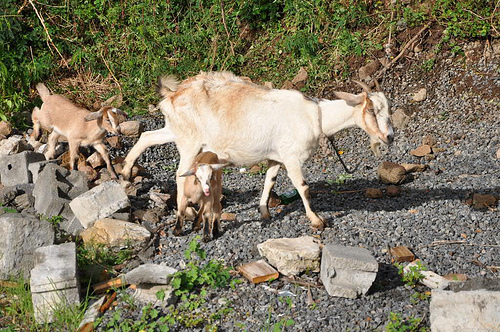 They’re a driving risk, to say the least.
They’re a driving risk, to say the least.